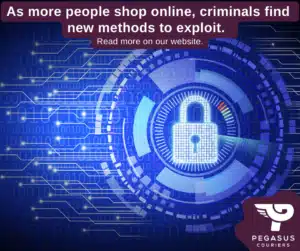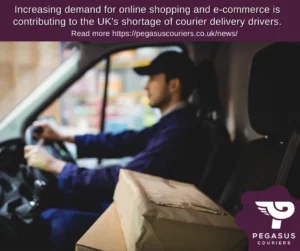Self-Employed Courier Insurance Cost If you’re thinking about self-employed courier...
Read MoreCyber Crime in the Courier Industry

Martin Smith
Pegasus Couriers MD

The courier industry has been through a lot in the last few years. There have been numerous advancements in technology that have changed the way we live and do business. This has led to significant consumer benefits but also new opportunities for fraudsters to exploit.
Despite these challenges, there is no doubt digital platforms have revolutionised the courier industry. This has increased efficiency and significantly improved the safety and reliability of courier services.
However, with these changes come new threats. As more people shop online or use mobile apps for banking transactions, criminals find new methods to exploit. With such advancements, it’s no wonder that the courier industry is experiencing a remarkable change.
Criminals Steal Billions
According to the UK’s National Crime Agency, courier fraud cost the UK economy £1.4 billion in 2022. Others reckon the total online cybercrime bill for the same year is around £4 billion.
One of the most significant developments is how criminals target their victims. Gone are the days when porch piracy and stealing packages are the only concern. However, with the rise of mobile apps and online shopping portals, criminals have changed tactics with new innovative ways to target their victims.
Criminals Adapt
Phishing scams are internationally recognised and are run by faceless syndicates – making it difficult to catch them.
Here are some of the more common scams in the UK:
Phishing scams and branding theft:
These emails or text messages look like they’re from a legitimate company, such as your bank or government agency. However, the criminals steal the branding and trick their victims into clicking on a link to provide their personal information, such as their password or bank card details. The fraudsters usually target their branding theft at multi-national couriers and major corporate companies.
Cash for job scams:
These ads offer you a job that requires you to pay money upfront. For example, you may be asked to pay for training materials or a uniform. The ads are from criminals trying to scam people out of their money. Do not pay funds; if there is any doubt, research.
These emails or text messages claim that you missed a delivery and ask you to click a link to reschedule it. When you click the link, you’re taken to a fake website asking for your personal information. Don’t click on any links in these messages; never provide personal information to someone you don’t know.
Parcel insurance scams:
These scammers contact online sellers and opt to pay for the item by sending cash in an envelope. The scammers will then ask the seller to pay for an “insurance cost” to the courier company. The phishing site will steal the seller’s debit or credit card information.
These messages claim that you must make a small payment for your package to be delivered. At one stage, the Royal Mail issued several warnings about this con. These messages can be challenging to tell apart from an authentic text or email. The scam results in the buyer entering their card details into a fraudulent – but authentic-looking – website.
Red Flags to Avoid Courier Fraud:
- Courier fraud usually starts with an unsolicited telephone call
- Typically the suspect will pose as a bank official, police officer, a computer or utility engineer.
- Courier fraudsters will usually request the victim purchase high-value items or provide a bank card for collection from a courier.
- Fraudsters will discourage victims from telling others
- Fraudsters will also state that they will arrange for a courier to meet the victim to collect the item they purchased.

Don't Become a Victim
The UK is not the only one hard hit by emerging cyber criminals. In the USA, online e-commerce fraud is expected to reach more than £38 billion this year, up from last year. Criminals are constantly finding new ways to target unsuspecting victims. It is important for companies and online buyers to stay informed about these threats and to take steps to protect themselves.
Contact your bank or credit card company immediately if you’ve been scammed. You should also report the scam to Action Fraud, the UK’s national fraud reporting centre. I hope you found this article helpful, and we have plenty more interesting courier-related news on our website.
Read More and Join Our Team
If you want more information, please read about courier insurance or how we used an off road vehicle to get parcels to our clients in the remote areas of the Scottish Highlands.
If you want to join our team and become a driver, please apply online and we will call you back to answer all your questions.
Local Courier News
Keeping you informed of local news at Pegasus Couriers.
FOLLOW US TO KEEP UP TO DATE:
Unlock Efficiency: Expert Courier Tips for Faster Parcel Delivery
UK Courier Service: Strategies to be the best Parcel Delivery...
Read MoreDriver Theory Test Cheats Impact All Road Users
Will Learner Driver Test Cheating Impact Businesses – Eventually? There...
Read More
What happens to undelivered parcels?
Waiting for a parcel delivery can be an exciting experience, but it can also be frustrating if it is late or doesn’t arrive.

Running out of fuel can land you in a spot of trouble
Did you know that an avoidable breakdown, such as running out of fuel, can land you in trouble?

Handbrake Safety and Prevention
Handbrake safety is becoming increasingly important. Read our tips on handbrake safety and rollaway prevention.

Do couriers know what is inside the parcel?
Courier drivers are responsible for delivering parcels, but do they know what they are delivering?



